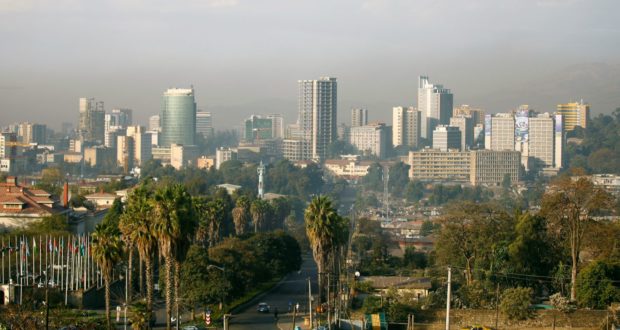
New film takes look at urban development in Ethiopia

Living in a tool shed on the outskirts of Ethiopia’s capital, 10-year-old Asalif Tewold straddles a unique space between modernity and tradition.
In his short life, he has lived on a rural farm and in the shadows of a towering condominium complex – learning how to dodge dangerous hyenas and land developers – as he and his dispossessed family try to find a place to call home.
The young boy and his mother are the subject of the film “Anbessa”, meaning “lion” in Amharic, one of Ethiopia’s main languages, that tracks their displacement off farmland to make way for a block of flats on the fringes of Addis Ababa.
The playful protagonist, Asalif, takes center stage of the documentary by U.S. filmmaker Mo Scarpelli, premiering in London on Wednesday at the Human Rights Watch Film Festival – as he lives and plays in the looming shadow of the buildings.
“Asalif is the perfect person … he lives literally on the rift of old and new,” Scarpelli told the Thomson Reuters Foundation.
“Anbessa” follows Asalif over two years as he seeks to ward off roaming hyenas both literally in the forest and in the form of lurking land developers.
As he carves out a space to call home, he and millions of others globally are learning that “progress” is not for them, said Scarpelli, as the film analyses universal themes of gentrification and urbanization.
Ethiopia, a nation of 105 million and an economic power in East Africa, is grappling with a housing crisis and new developments are leaving millions like Asalif out of the picture, Scarpelli said.
About 40 percent of Africa’s 1 billion people live in towns and cities and the urban population is expected to double over the next 25 years, the World Bank predicts.
“I do feel like there’s this kind of sweeping narrative about the future and about a better way of life that for sure has been exported from Europe and North America to the rest of the world,” said Scarpelli.
“That this is the way we should live – bigger is better.”
But the film is concerned with what gets lost along the way, from storytelling to family structures, steam-rolled by modernity, she said.
In Ethiopia, all land is formally owned by the state, making security of tenure rare and dispossession easier, said Felix Horne, senior Ethiopia researcher for Human Rights Watch.
Recourse to courts is often difficult, making forced displacement a major social issue, he said.
The contested edges of Asalif’s home also shed light on wider issues in Africa’s second-most populous nation, and a country in the midst of social and economic change.
Unrest spread in Ethiopia in 2015 and 2016, sparked initially by an urban development plan for the capital.
Anger over land expropriations and unfair compensation, in particular, drove protests, leading eventually to a new reformist Prime Minister Abiy Ahmed in 2018.
“Most residents of the city do feel stretched because there isn’t enough supply of decent housing for many of them,” said Mekonnen Firew Ayano, an Ethiopian legal expert at Harvard University in the United States.
“Rural dwellers have been pushed away from their land without any meaningful alternative.”
Ayano said the government’s housing policy targeted the middle and upper social classes and that the pace of growth was leaving many behind, which could stoke ethnic and social tensions.
Asalif’s story does not, however, present a clear division between good and evil, as the new tower blocks offer treasures and adventures for the child.
“Everybody living on either side is connected to each other, they can’t not be, and that’s the way that the world is,” said Scarpelli.
The film ends with Asalif, the metaphorical lion, besting the hyenas, and his future remains promising, said Scarpelli.
“I don’t know how things will unfold, but I do have a hope that the average Ethiopian will have more of a say on what happens to their land and their family moving forward.”






